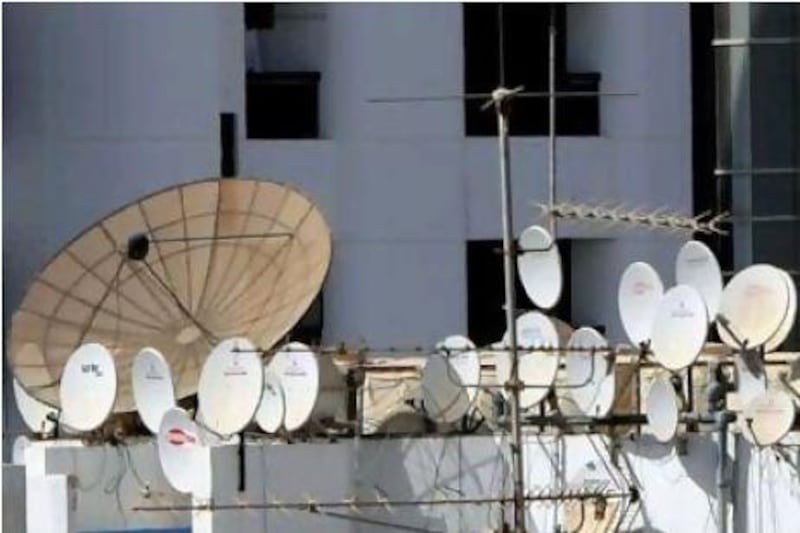Satellite TV channels owned by MBC, which is based in Dubai, have suffered "deliberate and planned attacks", with the jamming of signals traced to Tripoli, the capital of Libya.
The Saudi-owned broadcaster said sabotage had disrupted the reception of its channels, which include Al Arabiya news station.
An informed source within Al Arabiya, who spoke on the condition of anonymity, told The Nationalthe blocking of MBC's signals had been traced to a location "south-east of Tripoli".
The rival news station Al Jazeera said last month the jamming of its satellite feed also originated from a location south of the Libyan capital, and claimed the Libyan intelligence services were behind the interference.
MBC said the jamming affected broadcasts on the Nilesat satellite, and lasted "for several and repeated hours, leading to the absence of sound and visual".
The Al Arabiya official alleged that Libyan authorities were behind attempts to block MBC's broadcasts.
"The Libyan regime have used an outside broadcast truck to send an interruptive or strong satellite signal against our Nilesat frequencies," the official said. "Nilesat executives are telling us that this has also happened to other smaller broadcasters … deemed 'anti-[Muammar] Qaddafi'."
Jamming satellite signals is made possible by using a satellite set to transmit a signal at the same frequency as another station. This can disrupt or "knock out" the broadcast of a legitimate channel. The Association for International Broadcasting, based in the UK, said broadcasters including Alhurra and Al Jazeera had already experienced "deliberate, harmful interference".
Simon Spanswick, the chief executive of the association, said the MBC signal disruption originated from the same location as the signals that hit Al Jazeera.
"From what we understand, the jamming is coming from exactly the same place south of Tripoli, from the Libyan intelligence service," said Mr Spanswick.
Speaking on a trip to the UAE, he said he had met MBC representatives and his knowledge of the situation was based on information "passed around by broadcasters".
"The only ones likely to do this in this case would be a power worried about its citizens having access to information from a number of sources," he added.
"Freedom of speech is clearly being restricted in this case. This is symptomatic of a concerted effort to restrict the world's press within Libya. We condemn any action that restricts the flow of free and unbiased information."
Disruption of the signals was "amplified" during peak viewing times for its Al Arabiya news channel, MBC said. "MBC Group's bouquet of channels recently experienced a deliberate disruption in its broadcast on Nilesat," the broadcaster said.
"This assault also comes after a series of recurrent attacks on Al Arabiya's on-ground team of reporters, therefore confirming purposeful attacks not only on its reporters but also aimed at an audience of millions of viewers everywhere."
Like some other broadcasters, MBC has set up "temporary alternative frequencies" for its channels, including the Al Arabiya news station.
Bhaskar Khaund, the TV planning director at the media agency MEC, said the jamming of satellite signals in North Africa was unlikely to hit advertising revenues of the channels.
He said the disruption could actually provide a boost for channels such as Al Arabiya and Al Jazeera.
"I think something like this may end up increasing the eyeballs in the long run. If the powers that be deem it important enough to jam, for the viewers it could just add to the credibility of the channel," he said.
"The viewership is going to be up for sure … In the medium term, the next few months, I'm sure there will be an increase in the news channels' advertising revenues."
Mr Spanswick agreed the blocking of the satellite feeds was unlikely to have a major effect on advertising revenues. "It could have an impact, but I think it's fairly limited," he said.





